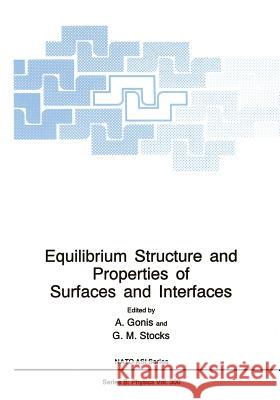Equilibrium Structure and Properties of Surfaces and Interfaces » książka
Equilibrium Structure and Properties of Surfaces and Interfaces
ISBN-13: 9781461364993 / Angielski / Miękka / 2012 / 371 str.
It is almost self-evident that surface and interface science, coupled with the electronic structure of bulk materials, playa fundamental role in the understanding of materials properties. If one is to have any hope of understanding such properties as catalysis, microelectronic devices and contacts, wear, lubrication, resistance to corrosion, ductility, creep, intragranular fracture, toughness and strength of steels, adhesion of protective oxide scales, and the mechanical properties of ceramics, one must address a rather complex problem involving a number of fundamental parameters: the atomic and electronic structure, the energy and chemistry of surface and interface regions, diffusion along and across interfaces, and the response of an interface to stress. The intense need to gain an understanding of the properties of surfaces and interfaces is amply attested to by the large number of conferences and workshops held on surface and interface science. Because of this need, the fields of surface and interface science have been established in their own right, although their development presently lags behind that of general materials science associated with bulk, translationally invariant systems. There are good reasons to expect this situation to change rather dramatically in the next few years. Existing techniques for investigating surfaces and interfaces have reached maturity and are increasingly being applied to systems of practical relevance. New techniques are still being created, which drastically widen the scope of applicability of surface and interface studies. On the experimental side, new microscopies are bearing fruit.











